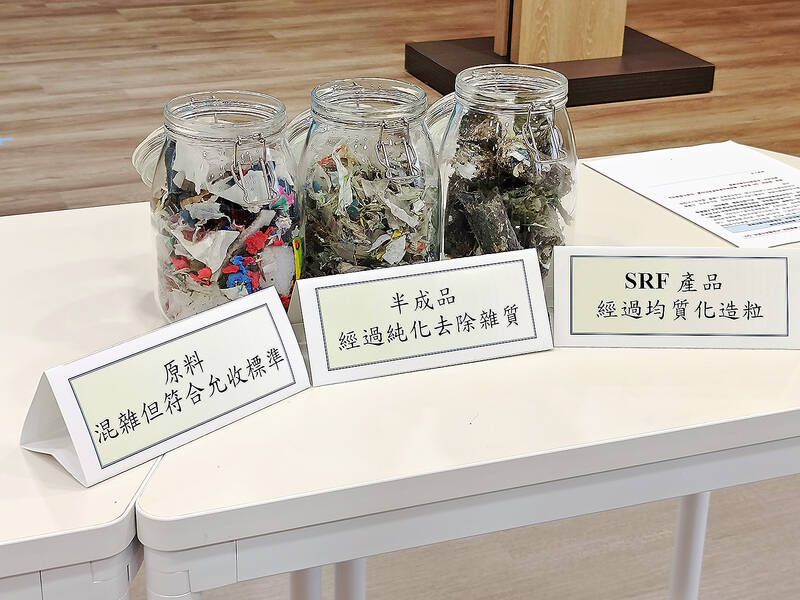The Ministry of Environment plans to propose stricter regulations on heavy metals and dioxins related to solid recovered fuel (SRF) by the end of the year, it said on Friday after releasing a report on the results of its nationwide inspection of 48 manufacturers and 18 users of SRFs.
SRFs are made from nonhazardous waste from businesses that can be burned as fuel, Minister of Environment Peng Chi-ming (彭啟明) said, adding that quality SRFs can only be produced through purification and homogenization.
The ministry would propose new SRF regulations by the end of the year to establish a third-party certification system, install closed-circuit television systems to monitor the areas where materials are collected and impose stricter standards on the emission of harmful substances such as dioxins, Resource Circulation Administration Director-General Lai Ying-ying (賴瑩瑩) said.

Photo: Wu Po-hsuan, Taipei Times
Under the stricter regulations, companies in the industry would have to make more effort and invest more to improve their products and processes, Peng said, adding that “this is not to increase the companies’ costs, but to increase Taiwan’s assets.”
SRF production volume has increased from 50,000 tonnes in 2019 to 290,000 tonnes last year, and most manufacturers were small and medium-sized businesses, Lai said, citing the report.
Although one manufacturer did not install an essential device for purification and homogenization of SRF, all manufacturers’ SRF products met quality standards, she said, adding that SRF combustion efficiency could be improved.
Eighteen manufacturers did not report where their products were sold, although it was required by law, and one manufacturer has never reported the destinations of its products, she said.
While 29 manufacturers sold SRF products directly to users in accordance with regulations, 11 did not and eight had yet to sell their products, she added.
Most SRF users were factories of large companies in the paper, cement and power supply industries, which mainly used coal, Lai said.
Although SRF-users’ sulfur oxides and nitrogen oxide emissions met regulations, 25 percent of the users fell short of the emission standards for dioxins, she said.
Overall, 52 to 70 percent of SRF manufacturers met standards and 30 to 48 percent needed improvements, while more than 90 percent of SRF users met standards and 6 percent should improve, she said.
Meanwhile, 14 SRF producers said they would leave the market after the inspection, while two manufacturers said they would stop production as SRF was not their main product, Lai said.
Two users said they would use other fuels instead of SRFs, she said.
Ten manufacturers said they would transition from the market as their waste had simple properties and as they had matured their waste reuse technology, she said.
About 6.5 million tonnes of waste is sent to incinerators every year, 1.8 million tonnes of which is business waste, Deputy Minister of Environment Shen Chih-hsiu (沈志修) said.
If business waste could be recycled using SRF production technology, incinerator capacity could be freed for burning noncommercial waste, which would reduce “waste mountains” in Taiwan, he said.

‘DENIAL DEFENSE’: The US would increase its military presence with uncrewed ships, and submarines, while boosting defense in the Indo-Pacific, a Pete Hegseth memo said The US is reorienting its military strategy to focus primarily on deterring a potential Chinese invasion of Taiwan, a memo signed by US Secretary of Defense Pete Hegseth showed. The memo also called on Taiwan to increase its defense spending. The document, known as the “Interim National Defense Strategic Guidance,” was distributed this month and detailed the national defense plans of US President Donald Trump’s administration, an article in the Washington Post said on Saturday. It outlines how the US can prepare for a potential war with China and defend itself from threats in the “near abroad,” including Greenland and the Panama

A wild live dugong was found in Taiwan for the first time in 88 years, after it was accidentally caught by a fisher’s net on Tuesday in Yilan County’s Fenniaolin (粉鳥林). This is the first sighting of the species in Taiwan since 1937, having already been considered “extinct” in the country and considered as “vulnerable” by the International Union for Conservation of Nature. A fisher surnamed Chen (陳) went to Fenniaolin to collect the fish in his netting, but instead caught a 3m long, 500kg dugong. The fisher released the animal back into the wild, not realizing it was an endangered species at

The Chinese Nationalist Party (KMT) is maintaining close ties with Beijing, the Democratic Progressive Party (DPP) said yesterday, hours after a new round of Chinese military drills in the Taiwan Strait began. Political parties in a democracy have a responsibility to be loyal to the nation and defend its sovereignty, DPP spokesman Justin Wu (吳崢) told a news conference in Taipei. His comments came hours after Beijing announced via Chinese state media that the Chinese People’s Liberation Army’s Eastern Theater Command was holding large-scale drills simulating a multi-pronged attack on Taiwan. Contrary to the KMT’s claims that it is staunchly anti-communist, KMT Deputy

The High Prosecutors’ Office yesterday withdrew an appeal against the acquittal of a former bank manager 22 years after his death, marking Taiwan’s first instance of prosecutors rendering posthumous justice to a wrongfully convicted defendant. Chu Ching-en (諸慶恩) — formerly a manager at the Taipei branch of BNP Paribas — was in 1999 accused by Weng Mao-chung (翁茂鍾), then-president of Chia Her Industrial Co, of forging a request for a fixed deposit of US$10 million by I-Hwa Industrial Co, a subsidiary of Chia Her, which was used as collateral. Chu was ruled not guilty in the first trial, but was found guilty